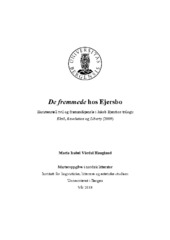| dc.contributor.author | Haugland, Maria Isabel Vårdal | |
| dc.date.accessioned | 2018-08-28T08:50:01Z | |
| dc.date.available | 2018-08-28T08:50:01Z | |
| dc.date.issued | 2018-06-22 | |
| dc.date.submitted | 2018-06-21T22:00:11Z | |
| dc.identifier.uri | https://hdl.handle.net/1956/18281 | |
| dc.description.abstract | Denne masteroppgåva omhandlar Jakob Ejersbos trilogi, beståande av romanane Eksil og Liberty, samt Revolution, ei samling av forteljingar, alle utgitt posthumt i 2009. Dei tre bøkene er formidla i form av tolv fyrsteperson-forteljarar, som deler med lesaren sine erfaringar av å leve i det postkoloniale. Trilogien er av den grunn eit aktuelt studieobjekt for postkolonial litteraturforsking. Dette forskingsfeltet er etablert av tre teoretikarar, Edward Said, Gayatri C. Spivak og Homi K. Bhabha, som alle hentar sine inspirasjonar frå poststrukturalistisk tenking. Gjennom sine teoriar formidlar dei ei form for skepsis til språket. Medan Said og Spivak stiller seg tvilande til at vestlege forfattar og lesarar kan forstå ikkje-vestlege, nyttar Bhabha eit poststrukturalistisk språksyn for å teoretisere korleis individ i det (post)koloniale etablerer ein hybrid identitet. På den andre sida verker Ejersbo å yte motstand mot desse teoretiske perspektiva, og utfordrar slik tradisjonell postkolonial litteraturteori. I mitt studie, hentar eg difor inn eit annleis språkfilosofisk perspektiv, kjend som daglegspråksfilosofi, med utgangspunkt i arbeidet til den amerikanske filosofen Stanley Cavell. Gjennom dette språksynet har eg som formål å vise korleis Jakob Ejersbo kan hjelpe oss å overkomme skepsisen til språket, og gjere erfaringar frå det (post)koloniale forståelege for lesaren, utan å freiste til ein generell slutning eller teori om det postkoloniale individet. Ved å særskilt fokusere på fire forteljarar frå trilogien – Samantha, Sofie, Shakila og Marcus – ynskjer eg gjennom mitt arbeid å syna korleis Ejersbo problematiserer ulike erfaringar av å ikkje kunne gjere seg forstått og høyre til blant andre. Samstundes argumenterer eg for at Ejersbo inviterer lesaren inn i ein anerkjenningsprosess av dei litterære personane og deira unike erfaringar frå det (post)koloniale. Gjennom mine lesingar har eg difor også som formål å vise korleis Ejersbo sin trilogi har eit filosofisk potensiale, i form av å lære oss å sjå, få oss til å tenkje og utvide vårt repertoar for kva vi kjenner som (post)koloniale erfaringar. Slik vil eg argumentere for at Ejersbo kan bidra til å gjere oss meir mottakelege for andre sine erfaringar. Ein kvalitet som i vår globale tid er viktigare enn nokon gong før. | en_US |
| dc.description.abstract | This dissertation revolves around Jakob Ejersbos trilogy, consisting of the two novels Eksil and Liberty, and the short story collection Revolution, all published posthumously in 2009. The three books are mediated through twelve first-person narrators, whom all share with their readers, their personal experiences of living in a postcolonial condition. The trilogy is therefore a relevant object for investigation within the field of postcolonial literary studies. Poststructuralist thinking inspires all the three theorists, Edward Said, Gayatri C. Spivak and Homi K. Bhabha, who established this field of study. Through their theories they convey a form of skepticism towards language. While Said and Spivak gives account to skepticism towards western authors and readers, by claiming that western individuals cannot understand non-western individuals, Bhabha take use of a poststructuralist view of language to theorize (post)colonial identity formation, by constructing something he calls hybrid identity. On the other hand, Ejersbo seems in some ways to kick against these theoretical perspectives, and by that reason also challenge traditional postcolonial theory. In my study, I am therefore turning towards another philosophy of language, known as Ordinary Language Philosophy, and more specifically the work conducted by the American philosopher Stanley Cavell. By means of OLP’s language view, I tend to show how Jakob Ejersbo can help us overcome skepticism towards language within the field of postcolonialism. And also make (post)colonial experiences comprehensible for the reader, without giving into the craving to put forward a general conclusion, or theory, about the postcolonial individual. By focusing on four of the narrators from the trilogy – Samantha, Sofie, Shakila and Marcus – I attempt to highlight how Ejersbo problematize different experiences of not being able to make oneself intelligible and not being attuned with others. At the same time I will suggest that Ejersbo invites his readers into a process of acknowledgement of his literary persons, and their unique experiences from living in the aftermath of colonialism. Throughout my reading I will, lastly, argue that Ejersbos trilogy is in possession of a philosophical potential, by encouraging us to see, think and expand our repertoire and notions of (post)colonial experiences. Based on this, I propose that Ejersbo can make us more amenable to others experiences. A quality more important in our age of globalization, than ever before. | en_US |
| dc.language.iso | nno | eng |
| dc.publisher | The University of Bergen | eng |
| dc.subject | Dansk litteratur | |
| dc.subject | Postkolonialisme | |
| dc.subject | Litterær analyse | |
| dc.title | «De fremmede hos Ejersbo»: Eksistensiell tvil og framandkjensle i Jakob Ejersbos trilogi: Eksil, Revolution og Liberty (2009). | eng |
| dc.title.alternative | «De fremmede hos Ejersbo»: Existential doubt and alienation in Jakob Ejersbos trilogy: Eksil, Revolution and Liberty (2009). | eng |
| dc.type | Master thesis | |
| dc.date.updated | 2018-06-21T22:00:11Z | |
| dc.rights.holder | Copyright the author. All rights reserved | eng |
| dc.description.degree | Mastergradsoppgåve i nordisk | |
| dc.description.localcode | NOLISP350 | |
| dc.subject.nus | 711123 | eng |
| fs.subjectcode | NOLISP350 | |
| fs.unitcode | 11-21-0 | |
